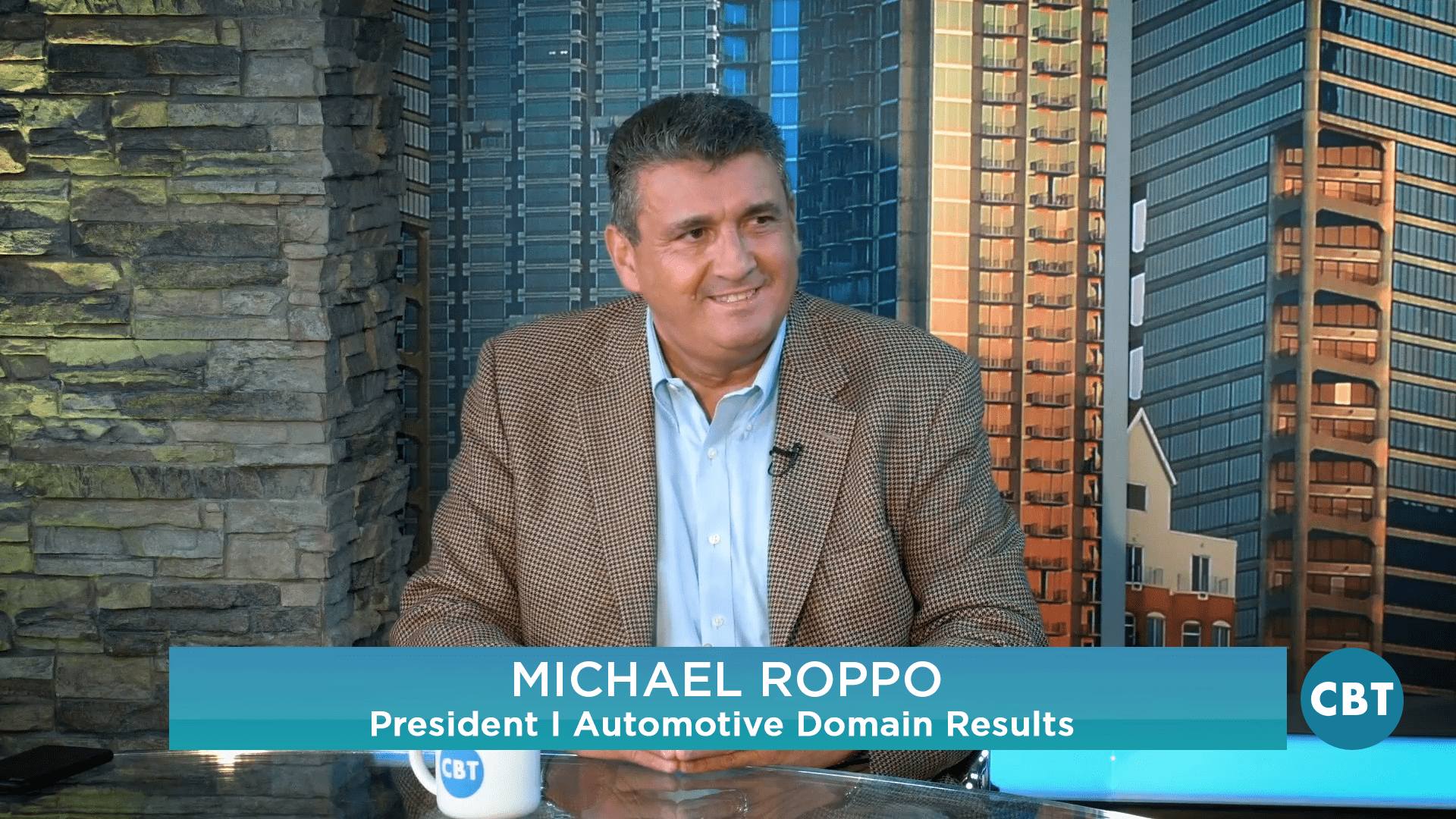On today’s show, we’re pleased to welcome back Michael Roppo, President and Director of Dealer Fixed-Operations Consulting and Training at Automotive Management Resources. Jim and Michael discuss hiring new technicians and what it takes to find them, train them, and retain them.
Michael says that without a doubt the most effective way to train new technicians is by placing them to work under another experienced and knowledgeable technician. Different colleges and programs are going to give them a great education, but the only way to get them the most efficient and hand-on experience is by having them apprentice with another expert in the field.


VIDEO TRANSCRIPT:
Jim Fitzpatrick:
Hello everyone. I’m Jim Fitzpatrick. Thanks so much for joining us on another edition of CBT News. We’re so happy to have in our studios with us today Mr. Michael Roppo. So welcome to the show, Michael.
Michael Roppo:
Jim, great to be here.
Jim Fitzpatrick:
Great. Great. Let’s first talk a little bit about the industry. Obviously, there’s a huge shortage of technicians out there. Dealers are kind of freaking out saying, “Where are we going to get this next generation of technicians?” As you know, NADA came out at the last convention and said that we need about 75,000 technicians in the industry. Where do you find these technicians? Why is there such a shortage?
Michael Roppo:
I think it’s a lot more than 75,000, Jim.
Jim Fitzpatrick:
Okay.
Michael Roppo:
And that’s really a sad thing to say. However, I think the people that they’re looking for need to be trained at the dealership. While there is organizations like Lincoln Tech and UTIs out there and whatever have you, they do a fine job preparing them. But I think the best training that you could possibly give a technician today is with another technician that knows the work.
Jim Fitzpatrick:
Yeah. Kind of an apprentice program.
Michael Roppo:
Absolutely. Absolutely. A true apprentice program.
Jim Fitzpatrick:
Sure, sure.
Michael Roppo:
That basically shows them how to do it from start to finish.
Jim Fitzpatrick:
So what kind of a candidate do you look for? If you’re a dealer, what is it you’re looking for in bringing on that type of candidate to work alongside the senior technicians?
Michael Roppo:
You’ve got to get past the technicality of it, and you’ve got to find people that want to work. That’s the first thing.
Jim Fitzpatrick:
Really?
Michael Roppo:
Yeah, absolutely.
Jim Fitzpatrick:
So it can be a trade that can be taught to anybody.
Michael Roppo:
It can be taught to anybody that wants to learn that trade. You have to have the passion to be in the industry. You can’t just wing this business. It’d be hurting a lot of people. So I think there’s an opportunity in the business. I think people that want to be techs wholeheartedly as a habit, as a career can make a tremendous amount of opportunity and money happen for them.
Michael Roppo:
I think that there’s definitely big dollars attached to it. If you pay attention to what it is that you’re doing, get in touch with the right person to train you. And the only way I see that happening is getting technicians, whether they come from specialized schools, ACT programs, ATC programs, ASE programs, whatever they are, whatever school they are, bring them onboard and get them with a tech that knows right away. And gauge that process from start to finish standpoint where they’re doing work with that technician that matters, not just doing oil changes because I see people make a lot of mistakes with no training program in place whatsoever. So I think there’s great opportunities there to do stuff like that.
Jim Fitzpatrick:
And then what does it look like for the senior technician that is training that individual? Do you pay them extra?
Michael Roppo:
Absolutely. You got to see back to the person that’s giving their time away. That’s the way it’s looked. You’re not going to put… And that’s where I think where most of these kids basically get into the line of work and they realize, “Wow, I have an uphill battle from here.” And when they see people, the kids are coming up and they want to take their hours away from them, they’re not going to train them properly. So I think, they need to seed back some of those dollars that those techs do generate as a cost to training them and making it beneficial for the dealership to hold onto those people by getting them trained from the people that are already out there producing and doing it well.
Jim Fitzpatrick:
Yeah, because there’s certainly a need for it. What are the pros and cons of recruiting, hiring technicians or I should say techniques for technicians with no experience? What do you suggest to dealers?
Michael Roppo:
I think you have to have some kind of base understanding of what it is that you want to do first of all. This is not something that people, “Okay, let’s just try it for a little while.” Even though the industry operates that way. I think getting them with the technicians as soon as possible, making sure that you grade him from the first week to the second week to the third week, all the way up to the 90 days to make sure that they’re giving you exactly what you’re looking for. And they’re getting from the industry what they’re looking for. Remember, it’s open book management, right? You’ve got to be brutally honest to make somebody move forward in this industry. It’s no joke.
Jim Fitzpatrick:
I know, I know. So because of the a very low unemployment rate right now in our country, which is a good thing, and every dealer wanting to attract and get more technicians in, we see a little bit more of a higher increase in turnover among technicians because it seems like they can go anywhere and write their own paycheck.
Michael Roppo:
They can, especially the millennial people. Millennial people in this industry will do well if they understand the technology. However, getting them past the where they work, a dealership that’s 110 degrees. All that’s got to do with something wanting to be into the industry. Right? So I think it’s more about what does the person want to do, what kind of trades does he bring to the table? What kind of value does he bring to the table? Can we build up on that value? It’s like Paul Cummings said, right? Everything’s based on those four areas: knowledge, attitude, skills and habits. You got to make that those things are in place. And I practice that process ever since I’ve been taught to me.
Michael Roppo:
So I think those players are out there. You got to seek out, embrace, and find who they are. You got to go to the schools, go to the vocational schools and the colleges. So I think that’s where those people need to come from. And then if they qualify for like a a BMW ACT program or some other type of program to be a manufacturer brand individual, depending on the scores that they have in school, they can get to those programs and come out. They come out of school even a master certified tech.
Michael Roppo:
So I think there’s opportunities there.
Jim Fitzpatrick:
So once you’ve got this good group of technicians, as many dealers do, how do you keep them? What kind of a culture do you need to build? Is it a question of hours? Is it a question of guarantees? Is it a question of working conditions? What keeps technicians happy and in place and keeps the competitors away from the door trying to poach them out?
Michael Roppo:
That’s a great question also. So I’m going to make it blunt for you. You ready? You got to pay them, and it’s got to be a fantastic environment to work in. So you could keep on employing and onboarding those people and coaching them and counseling them to do what it is that you need them to do.
Jim Fitzpatrick:
Right. So drill down a little bit. What, in your estimation, is a good work environment? If it was Michael Roppo Automotive Group, how would you create a culture that the technicians would be happy?
Michael Roppo:
Open book management. Keeping them informed about what’s going on in the company, making them have the amount of time that they need off where it doesn’t hurt the business. All those beautiful things that people want today and value. There’s no protection of the family unit in this industry. So long hours, getting beat up all the time. You only hear about comebacks and stuff like that. They need to be handled properly.
Michael Roppo:
And I’m going to tell you also management needs to know how to handle them properly. There’s a lot of managers that have been there, done that. I’m always reminded, “I’ve been here for 30 years.” Well you’ve been doing it wrong for 30 years. Okay. So those things happen to. I was just at a dealership the other day that quite honestly, I asked him, “Do you really want to increase your service business?” He goes, “Not really.”.
Jim Fitzpatrick:
Where’s that going?
Michael Roppo:
Exactly. How do you think, and this is a place that is not working. So they don’t want more business. They’re just trying to get by the day. I wouldn’t want to bring my car there. And there’s a lot of customers that probably feel that in that organization.
Jim Fitzpatrick:
How do we get our customers back in the service drive after they’ve taken delivery for a vehicle or from the dealership I should say on a vehicle? We still suffer in the industry for maybe a 30-35% retention rate of that customer and service. How do we change that?
Michael Roppo:
Why do you think that is? Okay. You readY?
Jim Fitzpatrick:
I have my own feelings on it.
Michael Roppo:
I think you need to invite them back sooner than later. Just to tell him that everything’s fine with your vehicle. Give him a welcome package. Do whatever you have to do. Just get them back sooner than later.
Jim Fitzpatrick:
We used to have a service orientation night for new owners.
Michael Roppo:
100%.
Jim Fitzpatrick:
And we’d serve whatever, pizza slices and soda.
Michael Roppo:
Sure. Get them educated.
Jim Fitzpatrick:
Just get them educated on the car.
Michael Roppo:
Absolutely.
Jim Fitzpatrick:
Answer any questions they might have.
Michael Roppo:
Absolutely. When you’re getting a nice shiny piece of metal on your driveway, you’re not focusing on what the salesperson’s telling you, man. You just want to get in a driveway. You’re not paying attention to what that person knows. If he knows what he’s talking about.
Jim Fitzpatrick:
That’s right.
Michael Roppo:
So the thing is-
Jim Fitzpatrick:
He or she.
Michael Roppo:
Yeah, and he or she. So the thing is, it’s got to get to a point where people need to come back for something of even more value.
Jim Fitzpatrick:
Because they’re kind of in a fog, aren’t they when they take delivery?
Michael Roppo:
They are. They are. They’re all excited and whatever. I think want to get that vehicle home.
Jim Fitzpatrick:
They’re already thinking of the first person to go show it to.
Michael Roppo:
Exactly right. Exactly right. And you’re not listening or have not listened to what it is that the salesperson spoke to them about. If he spoke about it in the first place.
Jim Fitzpatrick:
That’s true. That’s true.
Michael Roppo:
So that is a active delivery process.
Jim Fitzpatrick:
So what do you recommend for new owners? Put together some kind of a clinic or something for new owners to come back and and learn about the car.
Michael Roppo:
I don’t know if I wouldn’t want to say clinic anymore. I think it’s more what you said, which is like a customer orientation seminar or something like that. And bring them something of value when you come to these seminars. Do a raffle or something like that. That’s great advertisement, right? Advertise to your customer base, not somebody else’s, and you do that with the people that you sold. That would definitely help out in the retention rate.
Jim Fitzpatrick:
A dealership that sells, I don’t know, a couple of hundred cars a month. You could have one every week and load it up with 35 or 50-
Michael Roppo:
That’s correct.
Jim Fitzpatrick:
… different new owners.
Michael Roppo:
You can have it every week. I would have it every month because the show rate’s got to be there. It’s got to be supported from the top. It’s got to be done properly. It’s got to be of value. You’re asking somebody to come out. Some of the things that people value today is time, right?
Jim Fitzpatrick:
Yeah. Right.
Michael Roppo:
So you’ve got to make it valuable time to be at your dealership. Explaining to them how it is to take that new sales customer that just sold the car to be a brand new service customer.
Jim Fitzpatrick:
Yeah. That’s right.
Michael Roppo:
So if you look at the retention process, it’s got to be from sales to service and back to sales again. So service has got to be a better component of giving it back to the sales department too. So that’s where the customers are in your service drive. Your new car buyers, your new pre-owned car buyers are already in your service drive. Just ask them.
Jim Fitzpatrick:
That’s right. That’s right. No question about it. Michael Roppo, I want to thank you so much for joining us on CBT. And again, we can’t wait for your new show, The Weekly Tune Up right here on the CBT Automotive Network. I know you’re going to knock the cover off the ball.
Michael Roppo:
Very excited, Jim.
Jim Fitzpatrick:
Really appreciate it, man. Thank you.
Michael Roppo:
Thank you very much.








